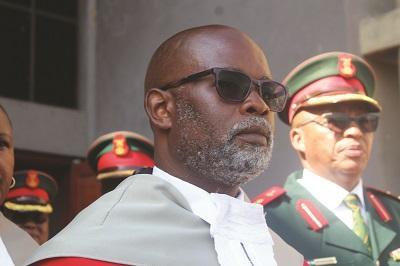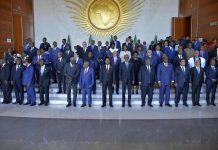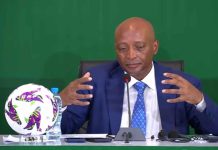Africa-Press – Lesotho. The Council of State has come under fire for its failure to Basotho Action Party’s (BAP) request to mount a tribunal to investigate the question Independent Electoral Commission’s (IEC) Commissioners following the error of miscalculating and consequently misallocating the proportional representation (PR) seats after the general elections held on October 7, last year.
This after the High Court sitting as the Constitutional Court (ConCourt) issued a strongly-worded judgment against the Council of State’s to address the BAP’s complaint.
By way of background, on January 13 this year, BAP penned a letter to the Council of State where it alleged constitutional breaches perpetuated by the IEC and had sought the establishment of the tribunal to investigate the fitness for three IEC Commissioners to remain in office.
The grievances that this opposition party had leveled before the Council are the Commission’s failure to organise by-elections and local government elections, issuance of constitutionally non-compliant delimitation order, failure to release voters list timeously and the famous miscalculation of proportional representation seats.
On February 2, the acting Senior Private Secretary to His Majesty Nyolusi Mphale responded to BAP’s letter saying their request was receiving “active consideration with relevant government stakeholders to make sure that a proper action and reaction is provided on the issues raised in the letter”.
Then BAP made another correspondence on March 21 and Mphale responded to this follow-up letter assuring BAP that their request has receiving attention and assured them that consultations were at an advanced stage promising to alert them of the outcomes.
Two months passed without hearing from the King’s Senior Private Secretary, BAP enlisted the legal representative to act on their behalf to pen a letter to the Council.
There being no reaction from the Council of State within a period of 14 days as requested in the letter, the applicants then petitioned the court and wanted it to declare failure to address BAP’s plea for establishment of a tribunal to interrogate the IEC’s Commissioners fitness to hold office as unconstitutional. They also sought the court to direct the Council of State, Minister of Law, Justice
and Parliamentary Affairs, Speaker of the National Assembly or President of Senate to cause for the promulgation of rules to regulate the procedure in the conduct Affairs of Council of State and/or its meetings as per the provisions of section 95 (11) of the Constitution read with Council of State Act No.5 of 1994 within 12 months after the grant of the Court’s order.
In this case, the applicants are BAP, Democratic Congress (DC), All Basotho Convention (ABC), Basotho National Party (BNP) and Popular Front for Democracy (PFD) being first to fifth applicants respectively.
BAP is the principal applicant and the quartet had joined it to seek a declaratory order and order of mandamus, which is an order seeking to enforce the undertaking of a legal duty.
The respondents are the Council of State, His Majesty the King, Minister of Law, Justice and Parliamentary Affairs, the Attorney-General, Mphasa Mokhochane, Dr Karabo Mokobocho-Mohlakoana, Tšoeu Petlane, Independent Electoral Commission (IEC), Speaker of the National Assembly, and the President of the Senate being first to 10th respondents respectively.
The Court found that “the Council of State’s failure to deliberate and or adjudicate over Basotho Action Party’s complaint in support of recommendation for establishment of a tribunal to probe the fitness of Commissioners of Independent Electoral Commission is unconstitutional”.
The judgment was written by Judge Realeboha Mathaba, and concurred to by both Judge Hopolang Nathane, and Judge Tšeliso Mokoko. The Council of State is the body that advises the King in the discharge of his functions and to exercise them as empowered by the Constitution. The King presides over the meetings of the Council and in his absence the Prime Minister chairs them.
The Council of State consists of the Prime Minister, the Speaker of the National Assembly, the Commander of the Lesotho Defence Force, the Commissioner of Police, a Principal Chief, a Leader of the Opposition party, a Member of Parliament, three people with special expertise, and a member of the Law Society.
According to section 66(4) of the Constitution, all political parties registered with IEC engage in a joint process of recommending the list of persons to the Council for the appointment to become Commissioners of IEC.
In that list of five candidates, the Council of State selects only three people to become Commissioners. The ConCourt has also in this instance taken aim at the political parties saying they “cannot escape the blame for appointment of IEC Commissioners who are not cut out for the job.
They are the ones in charge of the selection process. And properly exercising their power, must select the best candidates for the job”. The judgment continues “this Court concludes that the Council acted unconstitutionally for failing to consider BAP’s complaint within a reasonable time.
Constitutional obligations must be discharged within a reasonable time where the Constitution does not prescribe [a] timeframe for performance. “This Court is unable to grant incidental prayers in the notice of motion though they appear a logical consequence following the declaratory order.
Doing otherwise will offend the principle of legality and the structure of our Constitution which recognises separation of powers. Significantly, the applicants have not alleged and proved requirements for mandatory interdict.
“It bears emphasising that although the applicants have not succeeded with mandatory interdict that does not grant the Council a blank cheque not to observe its constitutional obligations. With each passing second without the Council sitting and considering BAP’s complaint, it continues to violate the sanctity of the Constitution. “
The ConCourt had also made an observation to the extent that the applicants failed to make a case for a mandatory interdict “though it appears a logical step following the declaratory order”.
According to the Constitution, “A member of the Commission [IEC] may be removed from office only for inability to exercise the functions of his office (whether arising from infirmity of body or mind or any other cause) or for misbehaviour and shall not be so removed except in accordance with the provisions for this section “.
This process is a result of the tribunal that would have been appointed by the King and that tribunal advises the King based on its findings to release the Commissioner/s from the office for failure to perform their constitutionally mandated responsibilities.
The ruling further notes that once the Council of State has apprised the King about the removal of the IEC Commissioner as per the provisions of section 66 of the Constitution, the King is constitutionally “bound” to appoint a tribunal to investigate the matter and after concluding such investigations the tribunal will report its findings to the King who is also “bound” to act on them.
The respondents argued that the petitioners do not have the jurisdiction of the ConCourt to raise these matters; instead they characterised them as rights-based review and argued that nowhere the applicants allege their rights have been violated.
They wanted the court to invoke the provisions of section 22(2) that says “. . . the High Court may decline to exercise its powers under this subsection if it is satisfied that adequate means of redress for the contravention alleged are or have been available to the person concerned under any other law”.
“As an interpreter and watchful guardian of the Constitution, it will be dereliction of duty were this Court to turn a blind eye when institutions critical to proper functioning of our democracy allegedly demonstrate lackadaisical attitude towards their constitutional obligations.
The case raises issues of great importance- it deals with constitutional duties of key stakeholders in our constitutional democracy which require clarification by this court.
The grievance that the Council is not performing its constitutional duty has a sound constitutional foundation,” further reads the ConCourt judgment in pertinent part.
The first applicant was represented by Attorney Monaheng Rasekoai, Advocate Christopher Lephuthing represented the second and fourth applicants while the third and fifth applicants were represented by Advocate Motebang Ramaili Senior Counsel (SC) and Advocate L.
Pheko. First, second, third, fourth, eighth, ninth and tenth respondents were represented by Advocate Thomas Thakalekoala and Advocate M. E. Tšoeunyane.
For More News And Analysis About Lesotho Follow Africa-Press






